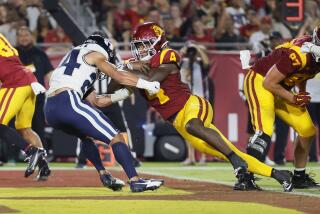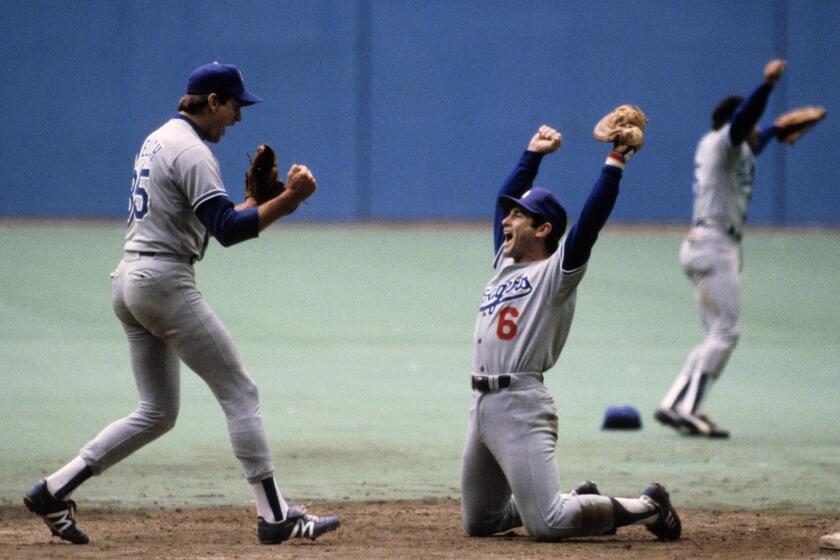There’s still grief for BCS outsiders
The Mountain West Conference continued celebrating its 10th birthday last weekend by blowing out four more candles: UCLA, Stanford, Arizona and Arizona State.
“We had a good week,” Commissioner Craig Thompson said of his league’s 4-0 cakewalk against the Pacific 10 Conference.
Actually, it was a dream week, but Thompson didn’t want to puff out his chest too far.
“One week out of 10 years doesn’t make you a BCS conference,” he said. “But it’s one of those weekends that we must continue to have.”
Brigham Young beat UCLA, 59-0, Texas Christian stymied Stanford, Nevada Las Vegas shocked Arizona State, and New Mexico upended Arizona.
The week before, Brigham Young beat Washington. The week before that, Utah won at Michigan.
Results, though, don’t change rules.
Thompson doesn’t expect college football’s power structure to teeter until 2014 -- at the earliest.
The Mountain West was born in 1999, a year after the Bowl Championship Series was created and the higher-ups established the parameters. The Mountain West got in, Thompson says, “after the train left the station.”
Ten years later, there are still six conferences whose champions receive automatic bids to the four major bowls and five conferences whose champions don’t.
The five that don’t -- Mountain West, Western Athletic, Mid-American, Conference USA and Sun Belt -- are left to scrap for four at-large berths.
The five that don’t are required to jump through qualification hoops. Their champion must finish in the top 12 of the final BCS standings or be top 16 if they’re ranked ahead of a BCS conference champion.
The Pac-10, Big Ten, Southeastern, Atlantic Coast, Big 12 and Big East conferences wrote the manual, and the rest of the conferences abide by it.
To avoid litigation, and possible Congressional intervention, the BCS conferences loosened the rules and threw more money down to the mail room, but they didn’t solve the potential inequity.
Utah, in 2004, had to finish in the top six to earn its way in, and hit its target on the number. Access has since been relaxed -- but the top-12 spot is only guaranteed for one team.
This is shaping up to be the best year ever for schools outside the six-conference power structure.
Brigham Young sits at No. 14 in the Associated Press media poll this week, followed by No. 15 East Carolina of Conference USA. Fresno State is No. 25 and Texas Christian, Tulsa, Ball State, Boise State are receiving votes.
There’s a decent chance more than one “non-BCS” school will finish in the top 12.
The biggest blow-back scenario would be BYU and East Carolina both ending up in the top 12 and East Carolina getting left out at the expense of the Big East or ACC champion.
What if those champions are West Virginia and Virginia Tech, teams East Carolina defeated this year?
The ACC is 1-9 in BCS bowls. Schools from “non-BCS” conferences are 2-1.
Coaches are grumbling.
“I really believe our conference is deserving of an automatic bid to the BCS,” UNLV Coach Mike Sanford said. “I think that’s something our conference should have.”
Added Texas Christian Coach Gary Patterson: “Right now I think it’s all about money, it’s not about the best football that can be played. A lot of people would say out there, ‘Nobody wants to watch somebody from the Mountain West play in a BCS game.’ . . . [But] I think everybody likes the underdog.”
The non-BCS commissioners signed off on the current structure because it was the best deal they could cut. And the next BCS contract probably will be more of the same.
The system is what it is.
“It’s really frustrating,” Thompson said.
Maybe the best way to force change would be for deserving teams to get left out.
“I would say it would give us a new argument,” Thompson said. “I don’t know if it would hasten the conversation.”
A commissioner might ask: How many more 59-0 conversations does a conference have to have?
Blitz package
* Stat of the year so far: UCLA’s 59-point margin of defeat against Brigham Young last week equals USC’s combined margin of defeat in 14 losses under Pete Carroll.
* Southern conspiracy theory voting watch: Not much to sniff out this week. The two AP voters who had Georgia No. 1 are Scott Wolf of the L.A. Daily News and Ray Fittipaldo of the Pittsburgh Post-Gazette. Wolf, who covers USC, has Georgia, followed by Florida and USC.
“No one knows who the best team in the country is right now,” Wolf explained in a story he wrote for his paper this week. “The great thing about college football is you can debate this fact all season.”
Wolf should have fun debating it around USC.
Fittipaldo’s top three are Georgia, USC and Missouri.
Bill Cone of the Winston-Salem Journal in North Carolina voted Florida No. 1.
ESPN analyst Kirk Herbstreit, a former Ohio State quarterback, has one of the state’s three AP votes. He dropped his alma mater to No. 13 after the Buckeyes’ 35-3 loss to USC.
* Cutting the Pac-10 some slack, sort of: The league is 10-10 in nonconference games this year. How might it stack up? The Pac-10 was 20-18 in 1999; the worst was 16-19-1 in 1983.
The Pac-10, though, has only two games scheduled this year against lower-level competition. The ACC has 14 -- every team except Wake Forest plays at least one. The Big Ten plays 10, and the Big 12 and SEC each play nine.
Three of the four major college schools that have never played a lower-level team are Pac-10 schools: USC, UCLA and Washington. Notre Dame is the other.
The Pac-10 has to play a tough nonconference schedule to overcome time-zone and east-of-the-Mississippi perception problems.
Sometimes you win big; sometimes you go 0-for-the-Mountain West.
* This year’s list of 114 Harris poll panelists was released Wednesday and includes the likes of former SEC commissioner Roy Kramer, longtime Penn State assistant Jerry Sandusky, former NFL quarterback Boomer Esiason, and Kevin Duhe, whose participation once drew chuckles when it was learned he was a territory manager for Blue Bell Ice Cream. The Harris poll became part of the BCS standings formula in 2005 after AP pulled out. The AP still crowns an independent champion. The first Harris poll will be released Sept. 28. The first BCS standings will be released Oct. 12.
--
More to Read
Go beyond the scoreboard
Get the latest on L.A.'s teams in the daily Sports Report newsletter.
You may occasionally receive promotional content from the Los Angeles Times.











